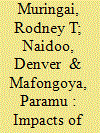|
|
|
Sort Order |
|
|
|
Items / Page
|
|
|
|
|
|
|
| Srl | Item |
| 1 |
ID:
173986


|
|
|
|
|
| Summary/Abstract |
Small-scale fisheries play a significant role as a source of employment, livelihood strategy and contributor to food security. However, changes in climatic variables alter the productivity and distribution of marine and freshwater fish species, negatively affecting the livelihoods of fishery-dependent communities. This study seeks to identify small-scale fishers’ livelihoods and examine the impacts of climate change on livelihoods and food security of small-scale fishing households. The study was conducted in Sanyathi fishing basin in Lake Kariba, Zimbabwe. The Sustainable Livelihood Approach framework of the Department for International Development was used to define the small-scale fishers’ livelihood assets and activities. The study employed a mixed-method approach for data collection. A pretested, semi-structured questionnaire, focus group discussions and observations were used to collect data from the small-scale fishers. The data collected were subjected to descriptive and bivariate analysis. The present results indicate that fishing is the community’s primary livelihood activity. More than 62% of fishermen stated that fishing revenue is declining, owing to declining fish catches. Of participants, 98% recognised food purchases as the primary source of food. Therefore, 78% of the small-scale fishers perceive their households to be food insecure due to declining incomes from fisheries. These findings show the need for policymakers and development agencies to formulate strategies that specifically target fishing communities whose livelihoods rely on natural ecosystems.
|
|
|
|
|
|
|
|
|
|
|
|
|
|
|
|
| 2 |
ID:
178262


|
|
|
|
|
| Summary/Abstract |
Drought is a major challenge threatening agricultural productivity in uMsinga. The occurrence of drought is expected to increase in coming decades, intensifying in severity, duration and the way people are affected by drought. The objective of this study is to understand small-scale farmers’ and rural communities’ perceptions of drought, its environmental and socio-economic impacts, adaptive and mitigation measures at household level and their satisfaction with the government’s role in drought management in the community. The study utilized a combination of quantitative and qualitative research methods, in the form of questionnaires, focus groups and key informant interviews. The sample size for the research study was 180 respondents for the questionnaire component and a total of 30 respondents for the focus groups and key informant interviews. The results show that increased levels of poverty, food insecurity and increased migration were the main socio-economic impacts perceived by respondents. Water scarcity, crop failure, forest degradation and an increase in average temperatures were perceived by respondents as the main environmental impacts caused by drought in uMsinga. Respondents perceived drought as a serious threat to agricultural production and adopted various indigenous adaptive strategies. A majority of respondents adopted a reactive approach to drought management, and therefore did not adopt many mitigation measures.
|
|
|
|
|
|
|
|
|
|
|
|
|
|
|
|
|
|
|
|
|